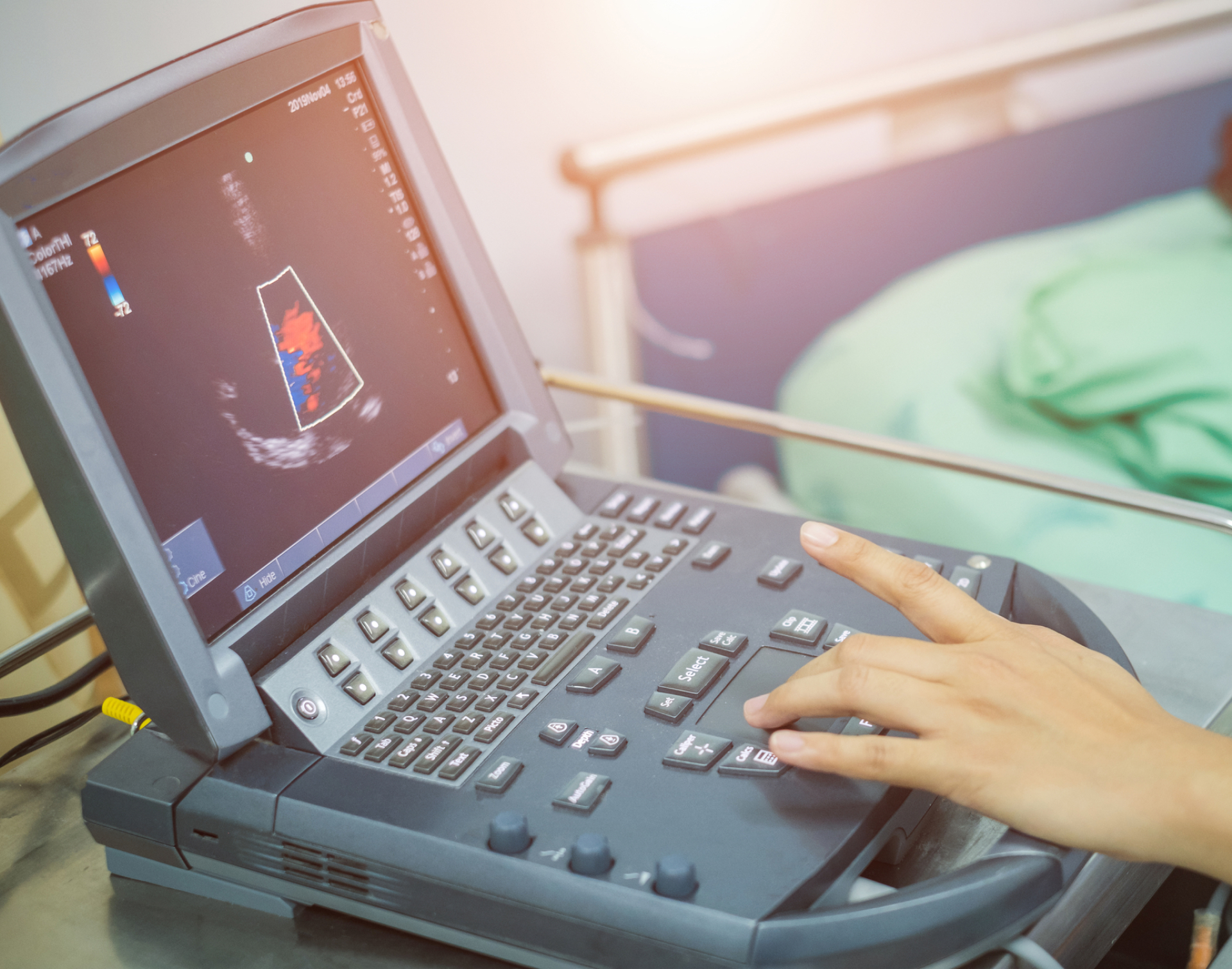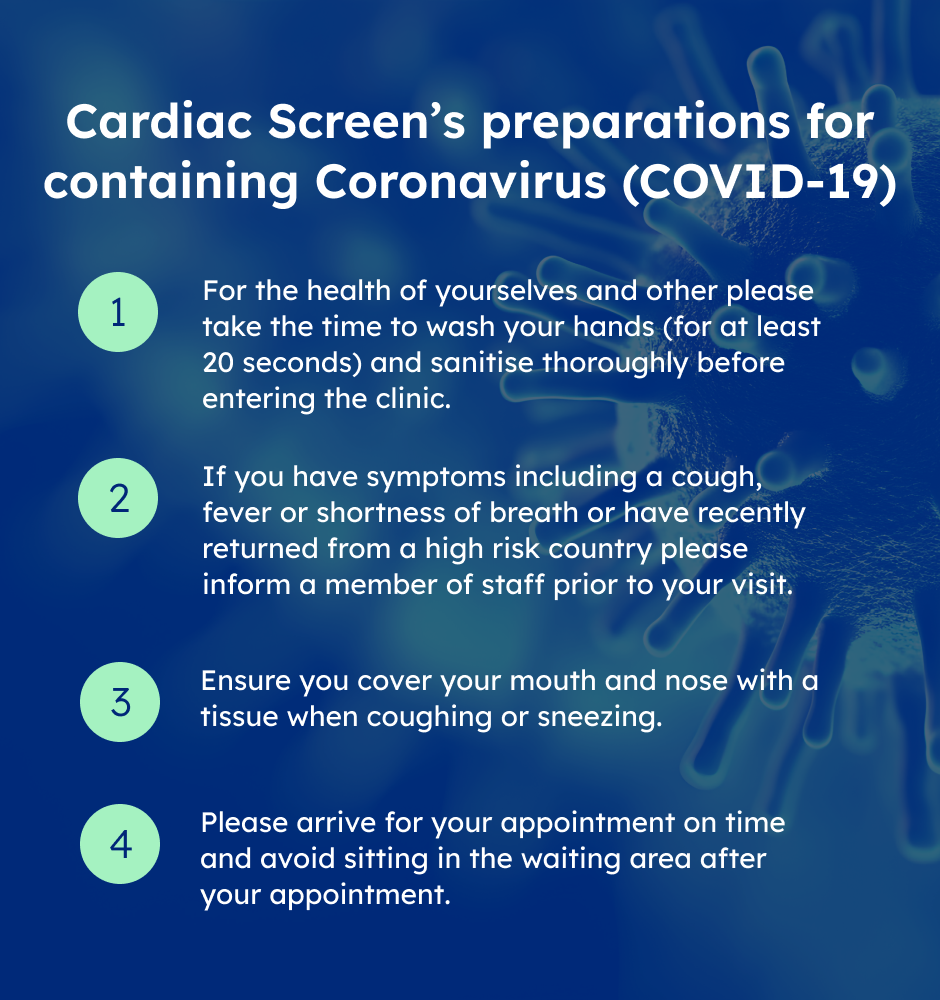Please click here to view Cardiac Screen's preparations for containing Corona Virus
Balppa House, 57-61 Newington Causeway, London SE1 6BD
Sports Screening
A consultation with a cardiologist
What is the Purpose of Sports Screening?
The factors that we consider during sports screening are shaped by the purpose of these check-ups. The aim of sports screening is to detect:
- Any issues that could be affecting your performance
- Health problems that could put you at risk when you exercise
- Anything that could put you at risk in the future
Screening is there to prevent problems. It could help you to avoid injuries by identifying a nutritional deficiency. It could help you to get treatment for a condition you weren’t aware of, such as high blood pressure or diabetes. In some cases, sports screening could even save your life by detecting a heart problem such as an arrhythmia or hypertrophic cardiomyopathy that could be triggered by exercise.
We would recommend :
If you have no family history of heart disease or any obvious symptoms and are under 35 years of age (£200.00)
Rest ECG
When you have a resting ECG, you will be asked to lie down and relax for about five minutes. During this time, a series of electrodes, attached to your skin with small sticky pads, will be recording the electrical activity going on in your heart. The electrodes are just recording devices, which cannot send out any electrical impulses of their own, so you will not feel a thing. The information they gather is transmitted back to the ECG machine, which will produce a chart or electrocardiogram showing how the electrical activity changes over time.
LIPID PROFILE
- Cholesterol: Measure the risk of cardiovascular disease, the lower the cholesterol value gets, the lower the risk of cardiovascular disease.
- HDL Cholesterol : Measures 'good cholesterol' that helps protect from heart
- LDL Cholesterol: Measures ’bad cholesterol' that collects in the walls of blood vessels, causing the blockages of
- Triglycerides: important to human life and are the main form of fat in the body and are used to provide energy to the High triglyceride levels have been linked to a greater chance for heart disease and diabetes.
Consultation with Cardiologist ( Optional ) £280.00
If you have a family history of heart disease or have any symptoms or are over the age of 35 years (£850.00)
Rest ECG
When you have a resting ECG, you will be asked to lie down and relax for about five minutes. During this time, a series of electrodes, attached to your skin with small sticky pads, will be recording the electrical activity going on in your heart. The electrodes are just recording devices, which cannot send out any electrical impulses of their own, so you will not feel a thing. The information they gather is transmitted back to the ECG machine, which will produce a chart or electrocardiogram showing how the electrical activity changes over time.
LIPID PROFILE
- Cholesterol: Measure the risk of cardiovascular disease, the lower the cholesterol value gets, the lower the risk of cardiovascular
- HDL Cholesterol : Measures 'good cholesterol' that helps protect from heart
- LDL Cholesterol: Measures 'bad cholesterol' that collects in the walls of blood vessels, causing the blockages of
- Triglycerides: important to human life and are the main form of fat in the body and are used to provide energy to the High triglyceride levels have been linked to a greater chance for heart disease and diabetes.
Exercise Treadmill ECG
Evaluates the electrical activity of the heart, blood pressure and heart rate with exercise. It is a useful test to detect coronary artery disease (any blockages of the heart arteries) and response of heart rate or any electrical heart disturbances of the heart rhythm & blood pressure response to exercise. Please bring along with a pair of running shoes and jogging pants/shorts for the treadmill ECG. The test takes approximately 30 minutes. The exercise test is carried out by using the Bruce Protocol The Bruce protocol is a standard test in cardiology and is comprised of multiple exercise stages of three minutes each. At each stage, the gradient and speed of the treadmill are elevated to increase work output, called METS. Stage 1 of the Bruce protocol is performed at 1.7 miles per hour and a 10% gradient. Stage 2 is 2.5 mph and 12%, gradient while Stage 3 goes to 3.4 mph and 14% gradient , Stage 4 goes to 4.2mph and a 16%gradient , Stage 5 does to 5mph and a 18% gradient .
Echocardiogram (Ultrasound of the heart)
Evaluates the heart structures by the use of ultrasound, or high frequency sound wave, which creates graphic images of the heart. The primary role of echocardiography in clinical practice is a non-invasive and cost-effective answer to the structure and function of the heart muscle and valves. There is no preparation required for the test, it takes approximately 20-30 minutes and is painless. The Echocardiogram measures the Left Ventricular Ejection Fraction (LVEF), which is a measurement of the percentage of blood leaving your heart each time it contracts.
Consultation with Cardiologist ( Optional ) £280.00
Do you have a Question?
Pricing
From only £200.00
Sports - No Family History Test is Available at a Special Reduced Rate!
Location
Sports - No Family History is available at
The Medical Specialist
Balppa House
57-61 Newington Causeway
London
SE1 6BD
Appointments
Same Day Appointments
You can have quick access with same day appointments.
Self Referral
If you are self-referral, our staff would be happy to get a brief history of your symptoms and advise you appropriately with what you will require and which consultant you will need to be booked with.
Contact
Please contact us by clicking the button below, or speak directly to one of our dedicated Patient Care team directly on 020 7403 5294
Cardiac at Home Services
Our unique cardiac at home service means we come to you to perform this test in the comfort of your home.
Do You Qualify?Client Reviews

Price From only £200.00
Sports - No Family History
A consultation with a cardiologist








 BOOK NOW
BOOK NOW 






